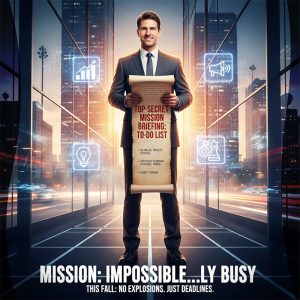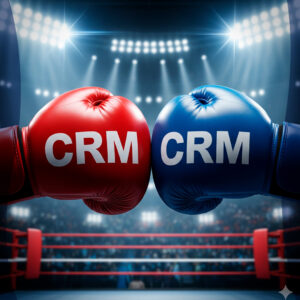
December Business Playbook: Retain Clients & Boost Revenue
Prepare Your Business for Q1 2026 December is not just
By Nadia Bulcourt – December 9, 2024

Is your sales team as efficient as it could be? In a market where every opportunity counts, improving sales productivity is no longer an option, but a strategic necessity for SME and VSE managers. Well-controlled productivity means less wasted time, better-qualified prospects, and sales that take off.
But to achieve this, it’s not enough to push your teams to “do more”: you need to give them the right methods, the right tools, and a clear vision of priorities. This requires a combination of proven strategies, a clear organizational framework, and a shared vision of business priorities.
In this article, we present 3 effective strategies for boosting your sales productivity, from optimizing tools to managing priorities and training teams.
Take a moment to evaluate your current processes and discover how these solutions can transform your sales efforts into concrete results. Whether you’re looking to maximize sales or build customer loyalty, these practical tips will help you structure and energize your sales organization.
To improve sales productivity, it’s essential to rely on high-performance tools and optimized processes. These not only simplify repetitive tasks, but also maximize the time your sales force spends on high value-added activities.
A well-chosen CRM (Customer Relationship Management) tool is the cornerstone of efficient sales management. It centralizes all customer information, past interactions, and the stages of each sales cycle. This eliminates the time wasted searching for information and improves coordination between team members.
What’s more, a CRM enables you to prioritize prospects according to their potential, thanks to features like scoring. By identifying the most promising opportunities, your salespeople can focus their efforts where they will have the greatest impact.
Repetitive tasks, such as sending follow-up e-mails or updating data, can quickly become time-consuming. Thanks to automation tools, these tasks can be carried out without human intervention, freeing up time for your teams.
For example, tools such as email sequencers or chatbots help automate part of the prospecting and customer support processes. This approach reduces processing times and increases your organization’s responsiveness.
Even with the best tools, poorly defined or unclear processes can hamper productivity. Precisely document every stage of the sales cycle, from prospecting to after-sales follow-up.
Make sure your teams share a common vision and have clear guidelines for what to do and how to do it.
This standardization not only improves productivity, but also ensures a consistent, professional experience for your customers.
With the right tools and well-structured processes, your sales organization lays the foundations for sustainable, scalable productivity. To go further, however, it’s important to work on training and motivating your teams.
A well-trained and motivated sales team is an essential lever for improving productivity. Employees’ skills, combined with their commitment, determine their ability to achieve set objectives. Here’s how to strengthen both aspects to maximize your results.
Customer expectations are changing, and sales methods need to adapt accordingly. Training your teams in new sales techniques, such as consultative selling or the use of digital tools, will improve their performance.
Targeted training, adapted to the specific needs of your sector, helps your salespeople to better understand customer expectations, ask the right questions and structure their sales pitches more effectively.
What’s more, these sessions help them build the confidence that is essential in business interactions.
A motivated salesperson is a successful salesperson. To maintain a high level of commitment, set clear, measurable, and achievable objectives. Stimulating but realistic challenges provide a clear framework for team efforts.
Accompany these objectives with appropriate rewards: target-based bonuses, public recognition, or specific benefits. These incentives, financial or otherwise, reward hard work and encourage your sales force to excel.
Motivation isn’t just about individual initiative. Create a team spirit by encouraging exchanges between your sales staff. Regular meetings, brainstorming sessions and the sharing of best practices reinforce cohesion and enable everyone to progress.
What’s more, a collaborative environment reduces individual pressure, improves job satisfaction, and boosts your teams’ commitment.
By investing in their training and motivation, you help your salespeople to remain competitive while cultivating a sense of belonging to the company. But to achieve concrete results, you need to prioritize the right actions.
In a sales environment, time is a precious resource. It is therefore essential to learn how to identify and prioritize the actions that generate the most value for the company.
Not all prospects are created equal. Some represent key opportunities, while others require too much time for few results. Regularly analyze your sales pipeline to distinguish qualified leads from less promising contacts.
By prioritizing prospects with high potential, your teams can focus their energy on the most profitable actions, improving conversion and reducing unnecessary time wastage.
To stay productive, salespeople need to know where to focus their efforts each day. Set specific objectives, such as the number of calls, appointments or proposals sent. These micro-objectives help to organize tasks efficiently while maintaining a constant momentum.
These objectives can be adapted according to the company’s priorities: strengthening prospecting, finalizing contracts, or ensuring rigorous customer follow-up.
Distractions, whether digital or organizational, are a serious drain on productivity. Help your salespeople limit these interruptions by setting up blocks of time dedicated to specific tasks (calls, emails, meetings, etc.).
What’s more, make sure your teams have a working environment conducive to concentration. A well-organized space and a corporate culture that values efficiency help maximize performance.
By focusing on high value-added actions, you can guarantee optimum use of your company’s resources. But don’t forget that a clear vision of objectives and structured support are essential to maintain these results over the long term.
Improving sales productivity isn’t just a matter of one-off optimization: it’s part of a global, coherent strategy. By combining high-performance tools, a well-trained and motivated team, and effective priority management, you lay the foundations for a solid, results-oriented sales organization.
At Finelis, we support the managers of SMEs and VSEs in their quest for sales performance. Thanks to our expertise in outsourcing, we help our customers to structure their processes, strengthen their teams and achieve their objectives efficiently.
Don’t let your sales opportunities slip through your fingers. Contact us today to find out how our tailor-made solutions can transform your results.
If you’re ready to take steps to grow your sales and are wondering which path to take is best—hiring, outsourcing, or training—we’re here to help.

Prepare Your Business for Q1 2026 December is not just

Between strategy, leadership, and delegation, learn how CEOs can transform their overwhelming to-do lists into powerful instruments of business clarity.

Understanding your website visitors means unlocking insights to sharpen your sales strategy, personalize outreach, and drive measurable results.

Lead generation is no longer about quantity but quality. In 2025, success comes from targeting the right prospects and guiding them with trust and care.

There is no absolute winner in the CRM battle. The right CRM is the one that matches your goals, teams and sales maturity.

Leadership can be isolating. Executive coaching provides support, perspective, and tools to help leaders make confident and effective decisions.